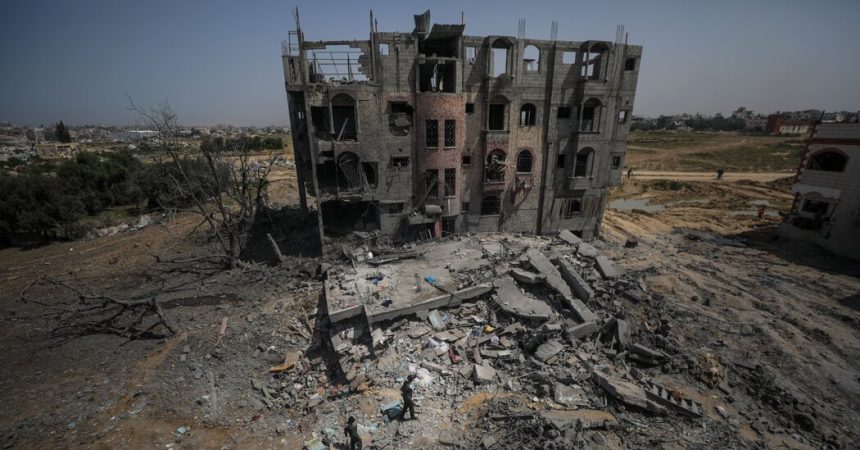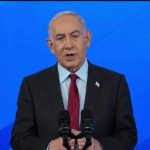Protesters call for Netanyahu to leave office.
Video

Thousands of Israelis filled the streets outside the Knesset, the Israeli Parliament, in Jerusalem on Sunday to call for early elections, in one of the most significant demonstrations against Prime Minister Benjamin Netanyahu’s government since the start of the war between Israel and Hamas.
Sunday’s protest in Jerusalem got underway just one day after thousands took to the streets of Tel Aviv in a separate anti-government protest, and as Mr. Netanyahu faces mounting anger from Israelis who believe he has put his political survival ahead of the broader interests of the Israeli people. It also comes as he goes into surgery to treat a hernia Sunday night.
The protest in Jerusalem is expected to last four days, with some demonstrators planning to stay in a cluster of tents near Parliament. On Sunday, several carried signs calling for Mr. Netanyahu’s “immediate removal” while others held posters calling for elections, saying “those who destroyed can’t be the ones to fix.”
Elad Dreifuss, a 25-year-old student, said protesting against the government in the midst of wartime was a difficult decision. But, he added, “if the government can’t live up to its responsibility, something has to change.”
Many Israelis have refrained from rallying against the government in the middle of Israel’s military campaign against Hamas.
“We held back for six months,” said Michal Begin, a physician from Jerusalem. “At the beginning, there was a sense that we had to be united for the sake of the war effort.”
But now “many of the reservists are back home, many soldiers have left Gaza,” she added. “Our need to mobilize for the intensive war effort has diminished. Now we can say that this government cannot continue to serve.”
At a news conference in Jerusalem on Sunday night ahead of his scheduled surgery, Mr. Netanyahu hit back at the criticism and demands being made by the protesters.
“Calls for elections now during the war, a moment before victory, will paralyze Israel for at least six months; in my estimate, for eight months,” he said. “They will paralyze the negotiations for the release of our hostages and in the end will lead to ending the war before achieving its goals, and the first to commend this will be Hamas, and that says it all.”
Mr. Netanyahu has come under sharp criticism for refusing to take responsibility for the failures that preceded the Hamas-led attacks on Israel on Oct. 7 and for failing thus far to strike a deal with Hamas to bring home the remaining hostages held by militants in Gaza.
But some worried that the protests could revive conflicts inside Israel that the war had temporarily smoothed over. In the months preceding Oct. 7, Israel had experienced immense domestic strife over a plan backed by Mr. Netanyahu to limit the influence of the judiciary. Massive protests against the effort had been taking place on a weekly basis, with demonstrators accusing the prime minister of trying to undermine the balance of powers and democracy in Israel.
Eitam Harel, a 23-year-old reservist from Jerusalem, watched flag-waving demonstrators gather near Israel’s Supreme Court with mixed feelings.
“Protest is a legitimate and praiseworthy thing,” Mr. Harel said. But he added: “The protests could drag us back to the negative discourse we had before the war.”
Organizers said they were hopeful the protest could shake up the Israeli political system.
“I believe Israel is facing one of the most difficult moments in its history,” Moshe Radman, an entrepreneur who is helping organize the four-day protest, said in an interview. “We need a government that will act for the betterment of the nation, not in the interest of political and personal considerations of a prime minister.”
Despite being on trial for corruption charges, Mr. Netanyahu became prime minister again in late 2022 after spending more than a year in the opposition. His critics have said that the court cases have influenced his decision-making.
Mr. Netanyahu has consistently repelled criticisms of his administration, including its handling of the war. He has asserted that his government was seeking a “complete victory” over Hamas, even though the militant group was still believed to have thousands of fighters nearly six months into the war.
As the first night of the Jerusalem sit-in wore on, some protesters set up tents to sleep in. The Israeli police said they had dispersed a crowd of protesters blocking traffic, making one arrest.
Johnatan Reiss contributed reporting from Tel Aviv.
— Adam Rasgon and Aaron Boxerman Reporting from Jerusalem
Netanyahu will undergo hernia surgery amid mounting pressure on his government.
Image
Prime Minister Benjamin Netanyahu of Israel was set to undergo surgery on Sunday night to treat a hernia, his office said in a statement.
The operation comes as Mr. Netanyahu is under mounting international pressure to negotiate a cease-fire and end the war in Gaza.
Mr. Netanyahu’s office said on Sunday that he had been diagnosed with a hernia during a “routine examination” the previous night. The prime minister decided in consultation with his doctors to have the operation, his office said in a statement, adding that the procedure would take place on Sunday evening “under full anesthesia.”
“Justice Minister Yariv Levin will be temporarily taking over his duties,” the statement said. Mr. Levin is a longtime stalwart in the prime minister’s Likud party.
Mr. Netanyahu — who also underwent surgery for a hernia in 2013 — has come under increasing criticism both on the world stage and at home over how Israel is prosecuting the war in the Gaza Strip. Key allies like the United States have criticized the high civilian death toll and have made urgent calls for Israel to allow more aid into the enclave.
In Israel, protesters have been demanding that Mr. Netanyahu prioritize the release of hostages held in Gaza and strike a deal for a cease-fire.
Mr. Netanyahu was also facing sharp criticism from his far-right coalition partners over any indication that he was hesitating in the war against Hamas or in the expansion of Israeli settlements in the occupied West Bank.
Hours before his scheduled surgical procedure, Mr. Netanyahu met in Jerusalem with families of soldiers held captive in Gaza.
He also delivered an evening news conference, looking pale as he hit back at criticism that he had not done enough to bring the hostages home.
“I’ve done everything in my power, and will continue doing everything, to secure their release,” he said, adding that “those who say I don’t do enough to secure the release of our hostages are wrong and misleading.”
Taking questions for nearly 20 minutes, Mr. Netanyahu also reiterated that Israeli forces would move into Rafah, the southern Gaza city where more than a million people have sought refuge. American officials have said that invading Rafah would create a humanitarian disaster and that Israel must have a detailed plan to protect, shelter and feed the civilians there.
“We are now working on addressing the question of evacuating the civilian population and providing humanitarian aid,” Mr. Netanyahu said. “That is required and vital, and it will be done.”
Advertisement
SKIP ADVERTISEMENT
In a strong Easter message, the pope calls for a cease-fire in Gaza.
Video

In a major annual message during Easter Sunday Mass, Pope Francis touched on conflicts across the globe and called for “an immediate cease-fire” in Gaza.
“My thoughts go especially to the victims of the many conflicts worldwide, beginning with those in Israel and Palestine, and in Ukraine,” he said to the tens of thousands of faithful, dignitaries, Swiss Guards and clergy filling St. Peter’s Square.
“I appeal once again that access to humanitarian aid be ensured to Gaza, and call once more for the prompt release of the hostages seized on 7 October last and for an immediate cease-fire in the Strip,” he added.
The pope also spoke about the continuing suffering in Syria because of “a long and devastating war.” He expressed concern for Lebanese people affected by hostilities on their country’s border with Israel. He prayed for an end to the violence in Haiti, an easing of the humanitarian crisis afflicting the Rohingya ethnic minority persecuted in Myanmar, and an end to the suffering in Sudan and in the Sahel region of Africa.
And in Gaza, he said, the eyes of suffering children ask: “Why? Why all this death?”
— Jason Horowitz reporting from Rome
Cease-fire negotiations resume in Cairo.
Image
An Israeli delegation held talks Sunday in Cairo for a cease-fire in the war in the Gaza Strip and the release of hostages held by militants there, according to two Israeli officials who spoke on the condition of anonymity to discuss sensitive diplomatic matters.
An Egyptian state-owned TV channel, Al Qahera News, had reported on Saturday that the talks would resume on Sunday, citing an Egyptian security official.
The resumption of in-person negotiations comes as the devastating war nears the end of its sixth month and as humanitarian officials are warning that only a cease-fire would allow aid groups to transport enough food and other aid into Gaza to avert a looming famine.
More than 32,000 Palestinians have been killed over the course of the war between Israel and Hamas, according to Gazan health officials, and negotiations to stop the fighting and release hostages held in Gaza have been stalled.
Bassem Naim, a spokesman for Hamas, confirmed by text that the group did not send a delegation to Cairo.
Hamas said last Monday that it had rejected an Israeli counterproposal. Talks have been at an impasse because of disagreements over the return of displaced Gazans to their homes, the permanency of any cease-fire and an Israeli withdrawal, among other points.
A third Israeli official, who also requested anonymity in discussing sensitive diplomatic matters, said that the nation’s war cabinet would convene on Sunday to discuss several issues related to the negotiations, including the question of displaced Palestinians returning to their homes in northern Gaza.
In an interview on Friday, Ghazi Hamad, a senior Hamas official, said Israel was refusing to allow Gazans to go back to the north en masse, and was insisting that they do so under “strict conditions and a few at a time.” He did not elaborate.
Egypt, Qatar and the United States, Israel’s staunch ally, have played the role of mediators in previous rounds of negotiations, with the two Arab nations serving as go-betweens with Hamas leaders. So far, however, a workable agreement has eluded all sides.
The mediators had pushed hard to secure a cease-fire before the start of Ramadan, but the Muslim holy month is more than half over.
Last Monday, the United Nations Security Council passed a resolution calling for an immediate cease-fire in Gaza and the “immediate and unconditional release of all hostages.” In a shift from its previous ironclad support for Israel, which has argued a cease-fire would allow Hamas to remain in power, the United States abstained from the vote and let the measure pass.
Previous talks have been held in Cairo and Doha, Qatar, where Hamas leaders have a presence, and the top mediators and Israel have met in Paris at least twice.
Advertisement
SKIP ADVERTISEMENT
Displaced Palestinian Christians marked Easter in Gaza’s only Catholic church.
Image
The only Catholic church in the Gaza Strip held somber Easter celebrations on Sunday for hundreds of displaced Palestinian Christians who have been sheltering within its compound since the war began nearly six months ago.
The Holy Family Church is in Gaza City, in the northern part of the strip, an area that has suffered some of the heaviest Israeli bombardment since October and where the global authority on food security says a full-scale famine is imminent.
Image
The families who have taken refuge at the church have been “scraping to get by” for months with limited food and “almost nonexistent” medical supplies — the same as all Palestinians in northern Gaza, including Muslims celebrating the holy month of Ramadan, said Father Davide Meli, the chancellor of the Latin Patriarchate of Jerusalem. “It’s a high holiday for all of us,” he said.
The priest of the Holy Family parish, Father Gabriel Romanelli, was in Bethlehem when the war began on Oct. 7, and Israeli authorities have repeatedly denied him permission to return to Gaza, according to Father Meli.
Image
Image
More than 500 people are sheltering at the Holy Family Church and approximately 300 others are at the historic Saint Porphyrius Greek Orthodox Church nearby, Father Meli said. Together, he added, they make up the vast majority of Gaza’s tiny and tight-knit Christian population.
Both churches have been attacked during the war. An Israeli airstrike killed 18 people at the Saint Porphyrius church in October, according to the Orthodox Patriarchate of Jerusalem, which condemned the attack as a war crime. The Israeli military later said it was targeting a nearby building.
Image
At the Holy Family Church in December, Israeli snipers killed a mother and daughter inside the church compound and injured seven others who rushed to help them, according to the Latin Patriarchate of Jerusalem. Church officials said Israeli rockets also hit a convent within the compound earlier that day, destroying the building’s sole generator and leaving some of the dozens of disabled people living there without working respirators that they needed to survive.
The Israeli military denied knowledge of the incident, which Pope Francis condemned as an attack on a church “where there are no terrorists, but families, children, people who are sick and have disabilities, sisters.” He called for an immediate cease-fire in his Easter address on Sunday.
Aid is slow to enter Gaza, despite a top U.N. court ruling demanding ‘unhindered’ access.
Image
When Christopher Lockyear, the secretary general of the aid group Doctors Without Borders, visited the Gaza Strip for five days this month, he took note of the miles of trucks waiting to deliver aid into the devastated enclave despite mounting international pressure to increase shipments.
On Thursday, the International Court of Justice in The Hague reacted to the continuing problems by ordering Israel to ensure the “provision of unhindered aid” into Gaza, using some of its strongest language yet. Israel has rejected accusations that it is responsible for delays in delivering aid, and it did so again this past week.
The amount of aid reaching Gaza has fallen sharply since the start of Israel’s war with Hamas. Months of bombs and street fighting have devastated entire neighborhoods, and experts continue to warn that Gazans unable to escape the war are facing a looming famine.
“It’s not just about the number of trucks coming in the border,” Mr. Lockyear said in an interview on Saturday. “It’s about what happens after that point. It is about the delivery. It is about sustained health care. It is about clean water.”
In its ruling on Thursday, the I.C.J., the United Nations’ highest court, called on Israel to increase the number of land crossings for aid and demanded that it ensure its military doesn’t violate Palestinians’ rights under the Genocide Convention, “including by preventing, through any action, the delivery of urgently needed humanitarian assistance.”
Israel’s Foreign Ministry responded by saying that Israel had gone to great lengths to mitigate harm to civilians and to facilitate the flow of aid into Gaza, “including in particular food, water, shelter equipment and medicines.”
On Oct. 9 — two days after the Hamas attack into southern Israel and the start of Israel’s war in Gaza — Israel imposed what it called a “complete siege” of the territory. Since then, aid has been allowed into Gaza only under restrictive measures that Israel controls; those rules also apply to aid sent by the United Nations and groups like Doctors Without Borders, which is known by its French acronym, M.S.F.
This past week, Mr. Lockyear said, an M.S.F. truck carrying medical supplies and equipment was prevented from entering Gaza because it was carrying metal devices that are used to help set broken bones. “These items, which were formerly approved to go in, we have got them into Gaza previously,” Mr. Lockyear said. This time, he said, “the whole truck was turned around because these items were there, and we don’t know why.”
A spokeswoman for the Israeli authority responsible for allowing aid into Gaza said the authority could find no record or information about an M.S.F. truck being rejected or refused.
Israel has previously said that it prevents or restricts entry of what it calls “dual-use” items — materials or items that it says Hamas could use for military purposes.
Mr. Lockyear said his five-day visit to Gaza, both in the southern city of Rafah as well as Deir al Balah in the central part of the territory, underscored for him the crucial importance of not only ensuring that sufficient aid gets into Gaza and is properly and safely distributed, but also the need to end the conflict itself.
The compounding effects of the humanitarian disaster and the continued military operations came into focus, he said, during a visit to Al Aqsa Hospital in Deir al Balah on March 19, the morning after the area endured another heavy bombardment.
The wards and corridors were full of wounded victims with burns, shrapnel wounds and crushed limbs, including some in need of amputation. Meanwhile, a steady stream of weak and bony children suffering from malnutrition was being brought in.
“One of the most shocking things there is the decision that the medical teams there were having to make, in terms of: Do they give beds to trauma patients, or do they give beds to malnourished kids?” he said.
On Saturday, the director general of the World Health Organization, Tedros Adhanom Ghebreyesus, called for increased evacuations out of Gaza. With battered hospitals struggling to care for the sick and injured, he wrote in a post on X, “around 9,000 patients urgently need to be evacuated abroad for lifesaving health services, including treatment for cancer, injuries from bombardments, kidneys dialysis and other chronic conditions.”
He urged Israel to approve more evacuations, saying, “Every moment matters.”











